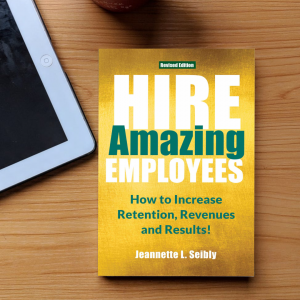
You have a choice in ‘how’ you listen to advice! Jeannette Seibly
We all love to give advice … solicited and unsolicited. But many of us don’t enjoy receiving it, and even when the advice is valid, we fail to use it to improve the issues, situations, or relationships we are grappling with.
The problems with giving and receiving advice:
- We are overconfident about our own perspectives
- We fail to define the actual problem, which creates circular reasoning
- We fear hearing what we don’t want to hear
- We learn we are not committed to doing the “real” work required
Charlie was excited when he accepted a job with Justin, a well-respected boss. However, when Charlie shared the successes of his first assignment, Justin gave unsolicited advice for future improvements. Charlie felt offended and unappreciated. He’d wanted to impress Justin by succeeding without help or advice.
When Charlie shared his upset with Jude, his coworker, she laughed. “Here’s the deal. You can listen to his advice and run with it. Or modify it. Or, give factual reasons it won’t work. But I would recommend listening to his advice with an open mind. At this company, we focus on delivering great results and are open to learning. FYI … You won’t last long at this or any other company if you’re uncoachable and often feel offended.”
As results producers, your willingness to listen to advice is how you and your teams achieve results that matter.
How to Move Your Career, Projects, and Results Forward
Set Aside Your Ego. There’s a saying, “Dial up your humility and dial down your ego.” If you remember nothing else from this article, remember to set aside your ego. When you are open to advice, regardless of how it’s offered, you’ll succeed further and faster in your career. Stay humble, and don’t let your blind spots derail you.
Ask Open-Ended Questions. “Can you please clarify what you mean? I want to be sure I understand.” OR, “Can you show me an example?” Don’t be obtuse … listen and be open to learning. Then, thank them. Now, either take their advice, modify it, or discard it.
Be Coachable. Get a third-party opinion from your mentor or executive coach, especially if you need help understanding what changes must be made or are emotionally attached to doing it your way. Remember, the recommendation offered can be a catalyst for your success, or it could be naysayers expressing their opinions based on their own experiences or observations.
Set Aside Being Offended or Annoyed. Being offended is not for professional people, and being annoyed is something you can train yourself to stop doing. Why? There is usually a gold nugget when you truly listen. But, of course, if someone is deliberately offensive, move on.
Be Prepared When Asking for Help. You’ve seen people overwhelmed when asking for advice on social media. Instead, talk with one or two trusted advisers (your executive coach or a mentor). First, share the problem in 20 words, briefly outline what has been done, and then ask, “What’s missing?” Now, listen without being defensive. Remember to take notes and take focused action!
How to Give Valued Advice
First, Ask. “Are you open to hearing advice?” If the person says, “No,” move on. If you’re the boss, ask if you can provide insights into a challenging issue, situation, or relationship they are experiencing. They usually will say “yes” and are now more open to listening to you. If they say “no,” you may need to make an unpopular management decision if the challenge persists.
Offer Only One or Two Valid Points. If you offer more, you’ll lose their willingness to listen or their ability to comprehend the information. Either use the sandwich approach or the straight talk approach, depending on the person.
Talk Privately. Remember the old saying, “Praise publicly, offer constructive guidance privately.” Follow it.
Be Open to Taking Advice. When you are willing and open to receiving advice, your advice will likely be considered “valuable.”
©Jeannette Seibly 2022-2024 All Rights Reserved
 Jeannette Seibly is a Talent Advisor/Leadership Results Coach with over 31 years of practical experience guiding leaders and bosses to improve their hiring, coaching, and managing practices and produce amazing results! And yes, achieving business success always starts with having the right people in the right jobs! She has been an Authorized PXT Select® Partner for over 32 years. Contact Jeannette to learn more about these state-of-the-art job-fit assessment tools or how to coach and manage your people to achieve incredible results.
Jeannette Seibly is a Talent Advisor/Leadership Results Coach with over 31 years of practical experience guiding leaders and bosses to improve their hiring, coaching, and managing practices and produce amazing results! And yes, achieving business success always starts with having the right people in the right jobs! She has been an Authorized PXT Select® Partner for over 32 years. Contact Jeannette to learn more about these state-of-the-art job-fit assessment tools or how to coach and manage your people to achieve incredible results.
A note from Jeannette: If you are easily offended or annoyed when someone offers you advice, it’s time to reconsider how you listen. Successful leaders are open to receiving solicited and unsolicited advice and move forward faster in their careers and projects, achieving intended results. Feeling uncertain how to handle advice? You’re not alone! Let’s chat now!
 It’s time to talk it out! Are there days you dread managing people, projects, and your team’s financial performance? You’re not alone! Everyone has their blind spots! NOW is the time to get the guidance you need to make the right changes during 2024. I have extensive experience and wisdom guiding bosses and leaders to hire, coach, and manage their teams successfully. The bonus is that they achieve unprecedented results. Contact me to learn more about my in-depth, one-on-one, customized coaching programs.
It’s time to talk it out! Are there days you dread managing people, projects, and your team’s financial performance? You’re not alone! Everyone has their blind spots! NOW is the time to get the guidance you need to make the right changes during 2024. I have extensive experience and wisdom guiding bosses and leaders to hire, coach, and manage their teams successfully. The bonus is that they achieve unprecedented results. Contact me to learn more about my in-depth, one-on-one, customized coaching programs.
 This book (“Hire Amazing Employees”) can help you improve your hiring process by Nancy Schick, NY Employment Attorney and Mediator. I met Jeannette Seibly a few months ago In this Together Round Table, where I also learned about her book, Hire Amazing Employees. Since my clients frequently struggle with this task, I bought myself a copy and gave several as gifts. The book contains many helpful tips for avoiding the impact of hiring errors. Read the full testimonial here.
This book (“Hire Amazing Employees”) can help you improve your hiring process by Nancy Schick, NY Employment Attorney and Mediator. I met Jeannette Seibly a few months ago In this Together Round Table, where I also learned about her book, Hire Amazing Employees. Since my clients frequently struggle with this task, I bought myself a copy and gave several as gifts. The book contains many helpful tips for avoiding the impact of hiring errors. Read the full testimonial here.


 It’s time to talk it out! Are there days you dread managing people, projects, and your team’s financial performance? You’re not alone! Everyone has their blind spots! NOW is the time to get the guidance you need to make the right changes during 2024. I have extensive experience and wisdom guiding bosses and leaders to hire, coach, and manage their teams successfully. The bonus is that they achieve unprecedented results.
It’s time to talk it out! Are there days you dread managing people, projects, and your team’s financial performance? You’re not alone! Everyone has their blind spots! NOW is the time to get the guidance you need to make the right changes during 2024. I have extensive experience and wisdom guiding bosses and leaders to hire, coach, and manage their teams successfully. The bonus is that they achieve unprecedented results.  This book (“Hire Amazing Employees”) can help you improve your hiring process, by
This book (“Hire Amazing Employees”) can help you improve your hiring process, by 
 It’s time to talk it out! Are there days you dread managing people, projects, and your team’s financial performance? You’re not alone! Everyone has their blind spots! NOW is the time to get the guidance you need to make the right changes during 2024. I have extensive experience and wisdom guiding bosses and leaders to hire, coach, and manage their teams successfully. The bonus is that they achieve unprecedented results.
It’s time to talk it out! Are there days you dread managing people, projects, and your team’s financial performance? You’re not alone! Everyone has their blind spots! NOW is the time to get the guidance you need to make the right changes during 2024. I have extensive experience and wisdom guiding bosses and leaders to hire, coach, and manage their teams successfully. The bonus is that they achieve unprecedented results. 
 What could you accomplish by unleashing your inner leader now? Are there days you dread managing people, projects, and your team’s financial performance? You’re not alone! Everyone has their blind spots! NOW is the time to get the guidance you need to make the right changes for 2024. I have extensive experience and wisdom guiding bosses and leaders to hire, coach, and manage their teams successfully. The bonus is that they achieve unprecedented results. Contact me to learn more about my in-depth, one-on-one, customized coaching programs.
What could you accomplish by unleashing your inner leader now? Are there days you dread managing people, projects, and your team’s financial performance? You’re not alone! Everyone has their blind spots! NOW is the time to get the guidance you need to make the right changes for 2024. I have extensive experience and wisdom guiding bosses and leaders to hire, coach, and manage their teams successfully. The bonus is that they achieve unprecedented results. Contact me to learn more about my in-depth, one-on-one, customized coaching programs.

 It’s time to unleash your inner leader! Are there days you dread managing people, projects, and your team’s financial performance? You’re not alone! Everyone has their blind spots! NOW is the time to get the guidance you need to make the right changes for 2024. I have extensive experience and wisdom guiding bosses and leaders to hire, coach, and manage their teams successfully. The bonus is that they achieve unprecedented results.
It’s time to unleash your inner leader! Are there days you dread managing people, projects, and your team’s financial performance? You’re not alone! Everyone has their blind spots! NOW is the time to get the guidance you need to make the right changes for 2024. I have extensive experience and wisdom guiding bosses and leaders to hire, coach, and manage their teams successfully. The bonus is that they achieve unprecedented results. 
 Jeannette Seibly is a Talent Advisor/Leadership Results Coach with over 31 years of experience guiding leaders and bosses to improve their hiring, coaching, and managing practices and produce amazing results! And yes, achieving business success always starts with
Jeannette Seibly is a Talent Advisor/Leadership Results Coach with over 31 years of experience guiding leaders and bosses to improve their hiring, coaching, and managing practices and produce amazing results! And yes, achieving business success always starts with  It’s time to unleash your inner leader! Are there days you dread managing people, projects, and your team’s financial performance? You’re not alone! Everyone has their blind spots! NOW is the time to get the guidance you need to make the right changes for 2024. I have extensive experience and wisdom guiding bosses and leaders to hire, coach, and manage their teams successfully. The bonus is that they achieve unprecedented results.
It’s time to unleash your inner leader! Are there days you dread managing people, projects, and your team’s financial performance? You’re not alone! Everyone has their blind spots! NOW is the time to get the guidance you need to make the right changes for 2024. I have extensive experience and wisdom guiding bosses and leaders to hire, coach, and manage their teams successfully. The bonus is that they achieve unprecedented results. 

 It’s time to get honest and genuine! Are there days you dread managing people, projects, and your team’s financial performance? You’re not alone! Everyone has their blind spots! NOW is the time to get the guidance you need to make the right changes for 2024. I have extensive experience and wisdom guiding bosses and leaders to hire, coach, and manage their teams successfully. The bonus is that they achieve unprecedented results.
It’s time to get honest and genuine! Are there days you dread managing people, projects, and your team’s financial performance? You’re not alone! Everyone has their blind spots! NOW is the time to get the guidance you need to make the right changes for 2024. I have extensive experience and wisdom guiding bosses and leaders to hire, coach, and manage their teams successfully. The bonus is that they achieve unprecedented results. 
 It’s time to get honest and genuine! Are there days you dread managing people, projects, and your team’s financial performance? You’re not alone! Everyone has their blind spots! NOW is the time to get the guidance you need to make the right changes for 2024. I have extensive experience and wisdom guiding bosses and leaders to hire, coach, and manage their teams successfully. The bonus is that they achieve unprecedented results.
It’s time to get honest and genuine! Are there days you dread managing people, projects, and your team’s financial performance? You’re not alone! Everyone has their blind spots! NOW is the time to get the guidance you need to make the right changes for 2024. I have extensive experience and wisdom guiding bosses and leaders to hire, coach, and manage their teams successfully. The bonus is that they achieve unprecedented results.